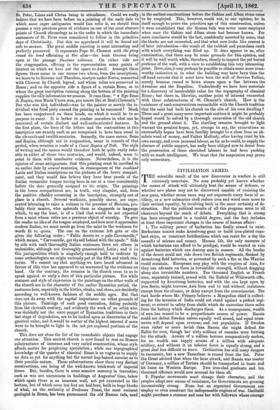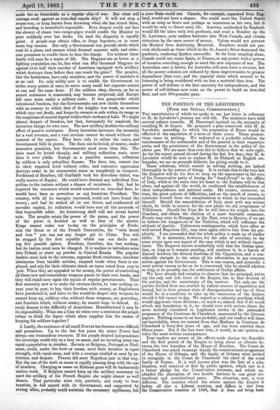CIVILIZATION ARMED.
THE scientific result of the new discoveries in warfare is still extremely uncertain. No man probably yet knows whether the means of attack will ultimately beat the means of defence, or whether new plates may not be discovered capable of resisting the new guns, whether steam rams may not supersede every form of ar- tillery, or a new submarine shell reduce iron and wood once more to their ancient equality, by involving both in the same certainty of de- struction. But the political results of all this progress seem to all observers beyond the reach of debate. Everything that is strong has been strengthened to a tenfold degree, and the fact includes at least three important changes in the course of human affairs: 1. The military power of barbarism has finally ceased to exist. Barbarians cannot make Armstrong guns or build iron-plated cupo- laed ships, or construct fortifications which can resist for a day the assaults of science and money. Human life, the only resource of which barbarians can afford to be prodigal, would be wasted in vain against batteries which can destroy men in masses. All the hordes of the desert could not ride down two British regiments, flanked by Armstrong field batteries, or protected by such a fire as the Warrior could maintain. Europeans may play with the empires of Asia, for they can advance on them in irresistible strength, without dragging along also irresistible numbers. Ten thousand English or French men, separately trained, armed with the Enfield or Whitworth rifle, supported by Armstrong batteries, and with the sea kept open by iron fleets, might traverse Asia from end to end without resistance except from the climate, or delay except from the commissariat. The vast horde whom Mr. Prinsep believes a Mongolian chief is collect- ing for the invasion of India could not stand against a picked regi- ment, or retreat in safety from shells which do execution three miles from the battery which discharges them. As a consequence, wealth of men has ceased to be a proportionate source of power. Russia could not defeat Sweden unless equally well armed, and equal arma- ments will depend upon revenue' and not population. If Sweden were richer or more lavish than Russia she might defend the Baltic for ever, though her sixty millions of enemies were fretting for the attack. Armies of a million become comparatively useless, for no wealth can supply armies of a million with adequate artillery, and without it an inferior force is equally strong, and a great deal less difficult to move. Civilization has still many dangers to encounter, but a new Tamerlane is erased from the list. Peter the Great advised that when the hour struck, and Russia was master of Germany, a million of Tartars should be transported in boats and let loose on Western Europe. Two iron-clad gunboats and ten thousand riflemen would now account for them all.
2. Popular movements mast change their character, and the peoples adopt new means of resistance, for Governments are growing inconceivably strong. None but an organized Government can employ or even construct the indispensable engines of war. Garibaldi might purchase a steamer and man her with followers whose courage made her as formidable as a regular ship of war. But what will courage avail against an iron-clad cupola ship ? It will not stop a steam-rain, or keep heroes from drowning when she has struck them, and boarding is henceforth impossible. Even despair could not face the shower of steam two escape-pipes would enable the Monitor to pour suddenly over her decks. On land the disparity is equally great. A people may obtain rifles, or forge bayonets, or in some cases buy cannon. But only a Government can provide shells which cost 51. a piece, and cannon which demand separate mills and elabo- rate processes to enable them to bear the charge. Yet without these battle will soon be a waste of life. The Magyars are as brave as a fighting population can be, but what can fifty thousand Magyars do against even half their number of Austrians equipped with artillery which destroys them before they can reach the guns ? The peoples, like the barbarians, have only numbers, and the power of numbers is at an end. Its only utility now is to enable the Government to strike many points at once, to move many small but separate armies at one and the same hour. If the soldiers obey, slavery, as far as armed resistance is concerned, may become perpetual, and Europe fall once more under a military caste. It was gunpowder which introduced freedom, but the Governments can now clothe themselves with an armour to which that of the knights was weak, an armour which rays out death, and keeps its owners as safe within its range as the magicians of ancient legend within their enchanted halls. We might almost despair of freedom, but that, fortunately for mankind, the invention brings its own cure. The new artillery doubles the military effect of passive resistance. Every invention increases the necessity for a vast revenue, and a vast revenue cannot be raised without the consent of the payers. They have only to refuse the taxes, and Government falls to pieces. The dues can be levied, of course, under excessive penalties, but Governments need more than this. The dues must be levied cheaply, and military collection costs more than it ever yields. Except as a punitive measure, collection by soldiers is only schoolboy finance. The dues, too, cannot rise to their required level without order, and excessive oppression destroys order in its commercial sense as completely as conquest. Ferdinand of Bourbon, till Garibaldi took his first-class ticket, was really master of Naples. He could have doomed any individual Nea- politan to the torture without a chance of resistance. But, had he required the resources which would construct an iron-clad fleet, he would have been as powerless as any American President. The country, with all its energies , repressed, could not have found the money; and had he staked all on one throw, and confiscated all movable capital, its collection would have cost all the proceeds of that impossible edict. An Armstrong shell will not reveal buried coin. The peoples retain the power of the purse, and the power of the purse is doubled as well as that of the armies. Kings cannot make war to-day on the principles of Frede- rick the Great or of the French Convention, for "with bread and iron" you can net any longer get to China. You will be stopped by the first republic which can use shells cost- ing five pounds apiece. Freedom, therefore, has lost nothing, but its tactics must soon be changed. It is useless to introduce arms into Poland, or store up powder in Central Russia. The popular leaders must look to the revenue, organize fiscal resistance, inculcate abstinence from taxable articles, suspend trade when force is em- ployed, and rely for their ultimate check on taxes voted from year to year. When they are appealed to for money, the power of controlling all these new and tremendous weapons passes to their own hands, and they will stand once again the equals of regular governments. Their first necessity now is to make the revenue theirs, to vote nothing ex- cept year by year, to buy their freedom with money, as Englishmen have purchased it, and leave to the would-be despot only weapons he cannot keep up, soldiery who, without those weapons, are powerless, and frontiers which, without money, he cannot hope to defend. Al- ready finance is the difficulty of despotisms. Henceforward it may be its impossibility. What can a Czar do when over a continent the people refuse to drink the liquor which alone supplies him the means of keeping his soldiers together?
3. Lastly, the existence of all small Powers has become more difficult and precarious. Up to the last few years the minor Power had always one tremendous resource. If the people desired independence the sovereign could rely on a levy en masse, and no invading army can equal a population in number. Bavaria or Belgium, Portugal or Pied- mont, could, under the levee en mane, meet their invaders in equal strength, with equal arms, and with a courage exalted at once by pa- triotism and despair. Prussia did meet Napoleon just in that way. But the use of the levee en mane is rapidly passing away with the use of numbers. Charging en mane on Rodman guns will be barbarously useless work. If Belgium cannot keep up the artillery necessary to meet the artillery of the French Empire she might almost as well disarm. That particular state rich, patriotic, and ready to bear taxation, in full accord with its Government, and supported by strong allies, probably could maintain the necessary appliances, but a poor State could not. Canada, for example, separated from Eng- land, would not have a chance. She could meet the United States with an army as brave and perhaps as numerous as her own, but it would be only to throw away life. America, unchecked by England, would fill the lakes with iron gunboats, and send a Monitor up the St. Lawrence, pour endless batteries into West Canada, and remain victorious by the mere power of money. Valour would not prevent the Monitor from destroying Montreal. Numbers would not pre- vent shells such as those which in the St. James's River destroyed the gunboats, rendering Quebec untenable. So far from standing alone, Canada could not resist Spain, or France, or any power with a system of taxation searching enough to meet the new expenses of war. The Australian case is better, for Australia will soon have a revenue, but all the poorer colonies are reduced by these improvements to greater dependence :than ever, and the imperial chain which seemed to be loosening is being resoldered with no less a material than iron. The power of self-defence is the first necessity for independence, and the power of self-defence now rests on the power to build an iron-clad fleet, and cast 300-pounder guns.































 Previous page
Previous page